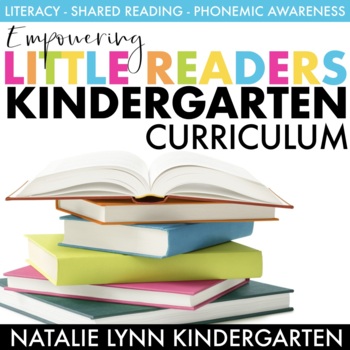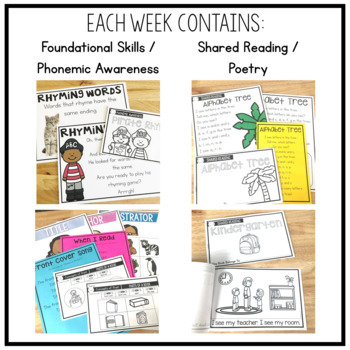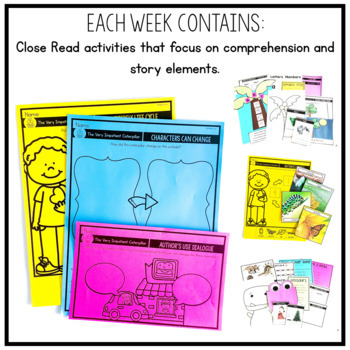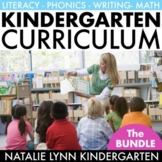Kindergarten Literacy Curriculum Interactive Read Aloud Lesson Plans
- Zip
What educators are saying
Products in this Bundle (10)
showing 1-5 of 10 products
Also included in
- Teaching kindergarten has never been easier! This kindergarten complete curriculum bundle includes systematic, research-based, age-appropriate, and EFFECTIVE curriculum for kindergarten. Everything you need to teach effective lessons in kindergarten is included.This curriculum is designed with classPrice $250.00Original Price $440.00Save $190.00
Description
Kindergarten teachers, are you looking for something to make planning for your whole group literacy block or Reader's Workshop time easy, fun, and developmentally-appropriate? These kindergarten interactive read aloud units contain everything you need to teach foundational skills, phonemic awareness, reading comprehension, story elements, shared reading, vocabulary, mentor sentences, and Kindergarten grammar.
The Empowering Little Readers Kindergarten reading curriculum is based on the close read model for interactive read alouds - each week you will focus on one book and going deeper within that text.
Digital Options for Distance Learning: I have added in options for some of the recording sheets to be used in Google Slides™ and Seesaw™. I was not able to make all activities digital, but most.
Each week contains 5 days worth of lesson plans for you with foundational or phonemic awareness activities, shared reading with weekly poems, whole group interactive read aloud lessons, independent work, vocabulary, mentor sentences, grammar, literacy crafts, original nonfiction books, and directed drawings.
⭐What is included in each unit?
➞Interactive Read Aloud Lesson Plans: Each week includes interactive read aloud lesson plans based around the close reading model. These lesson plans will teach reading comprehension skills using picture books as mentor texts.
➞Student Reading Comprehension Response Worksheets: Each lesson includes student reading response worksheets to follow the mini lesson. These grow in difficulty throughout the year to meet your Kindergarten students where they are.
➞Nonfiction Books: Original nonfiction books are included each week, beginning week 3. These books will help students connect fiction and nonfiction texts and topics.
➞Phonological and Phonemic Awareness: Each week includes daily phonological and phonemic awareness lesson plans. These are quick daily phonemic awareness mini lessons and games, and usually includes one worksheet per week.
➞Vocabulary: Four vocabulary words from the interactive read alouds are introduced each week. Daily vocabulary mini lessons and worksheets are included.
➞Shared Reading: Weekly poems for Kindergarten are included for shared reading. These are original poems! Student poetry folder and notebook printables, and poem emergent readers are included.
➞Crafts and Directed Drawings: Each week includes one Kindergarten craft and one directed drawing to go along with the story.
➞Kindergarten Mentor Sentences and Grammar Curriculum: Mentor sentences and Kindergarten grammar mini lessons are currently being added to each unit! This includes a mentor sentence related to the picture book, Kindergarten mentor sentences daily mini lessons, and student printables. The mentor sentence routines also include Grammar lessons and Kingargarten grammar worksheets.
What if I don't teach Aug-May?
These can be taught whenever you are in school! I personally begin teaching in September and we will start with the August unit. You can teach the books out of order, but I suggest not moving the foundational skills/phonemic awareness lessons as they will build on each other. BONUS BOOKS can be swapped in where you want or used to extend the year.
Books needed (must be purchased separately):
AUGUST
- The Pigeon Has to Go to School
- Chicka Chicka Boom Boom
- We Don't Eat Our Classmates
- Tiny Trex and the Impossible Hug
SEPTEMBER
- After the Fall
- You Get What You Get
- The Panda Problem
- Under My Tree
OCTOBER
- Fire! Fuego! Brave Bomberos
- Escargot
- Leonardo the Terrible Monster
- Stumpkin
NOVEMBER
- Because of an Acorn
- Little Red and the Very Hungry Lion
- Turk and Runt
- Sleep Big Bear Sleep
DECEMBER
- Mother Bruce
- Goodbye Winter Hello Autumn
- The Wish Tree
JANUARY
- Almost Time
- Saturday
- Penguin Problems
- Can I Be Your Dog?
FEBRUARY
- Finding Kindness
- The Love Letter
- Alan's Big Scary Teeth
- Truman
MARCH
- The Box Turtle
- The Tiger Who Lost His Stripes
- The Thing About Spring
- The Seedling That Didn't Want To Grow
- Jamie O'Rourke and the Big Potato
APRIL
- Harlem Grown
- Too Many Carrots!
- When The Storm Comes
- Snail Crossing
MAY
- The Very Impatient Caterpillar
- When Grandma Gives You a Lemon Tree
- Ohana Means Family
- Jabari Jumps
- The Watermelon Seed
Kindergarten Grammar Curriculum:
AUGUST
- Sorting into Categories
- Nouns
SEPTEMBER
- Nouns
- Verbs
- Nouns and Verbs
OCTOBER
- Nouns and Verbs
- Sentences Begin with Capital Letters
- Punctuation - Periods
- Adjectives
NOVEMBER
- Antonyms
- Nouns and Adjectives
- Nouns, Verbs, and Adjectives
- Complete Sentences
DECEMBER
- Subject
- Verb
- Writing Complete Sentences
- Common and Proper Nouns
JANUARY
- Plural nouns
- Plural nouns with s and es
- Prepositions (positional words)
- Prepositions of movement
FEBRUARY
- Pronoun I
- Capitalizing I in a sentence
- Questions and question marks
- Questions and question words
MARCH
- Exclamation points
- Verb tense - future verbs
- Verb tense - present tense verbs
- Verb tense - past tense verbs
APRIL:
- Verb Tenses Review
- Synonyms
- Shades of Meaning
MAY:
- Homophones
- Homonyms - Multiple Meaning Words
- Writing sentences and editing
- Contractions
FREQUENTLY ASKED QUESTIONS
What are the benefits to using Kindergarten interactive read aloud lessons in your classroom? Interactive read alouds give your read alouds purpose! They allow you to meet standards in an engaging way while using picture books as mentor texts to teach comprehension strategies. They also give students a connection to new vocabulary words.
These books seem too hard for my Kindergarten students! You, the teacher, will be reading these books to students whole group. They will be working on comprehension strategies while listening to the story. These interactive read alouds will not take the place of your phonics instruction or small group reading instruction.
How would you suggest fitting these interactive read alouds into my ELA block? These kindergarten interactive read alouds would take place during your whole group reading curriculum (classroom read alouds). This might look like:
- Phonemic Awareness Mini Lesson - 5 minutes
- Shared Reading - 5 minutes
- Empowering Little Readers Lesson - 20 minutes
- Students complete independent practice from the lesson (this is their ticket to centers) - 5 minutes
- Literacy Centers and Small Group Reading - NOT in this curriculum
- Phonics Lesson and Practice - NOT in this curriculum
- Vocabulary Mini Lesson - 5 minutes
- Mentor Sentence and Grammar Mini Lesson - 5-10 minutes
What are the benefits to using mentor sentences in Kindergarten? Mentor sentences allow Kindergarten students to work on concepts of print, fluency and reading with expression, and grammar skills while relating to their read aloud.
What do the Kindergarten vocabulary lessons look like? The kindergarten vocabulary lessons are short mini lessons. Each week will focus on 4 vocabulary words that come from the interactive read aloud, which will give students a connection to the words. Students will learn the vocabulary words with hand motions, define and illustrate the vocabulary words, and match the words to pictures.
What does shared reading look like in Kindergarten? Shared reading is kindergarten poetry. All kindergarten poems included in these units are original poems written by me! Each day, you will read the kindergarten poems together for fluency. Students will receive their own poems to put in a poetry folder or notebook. They will also receive a paper poem book for each poem.
What do the kindergarten phonological and phonemic awareness lessons look like? These are quick, teacher-directed phonological and phonemic awareness mini lessons. They are scripted for you. Some weeks include a game and/or worksheet, but not every week.
Questions? Email me at natalielynnkindergarten@gmail.com






